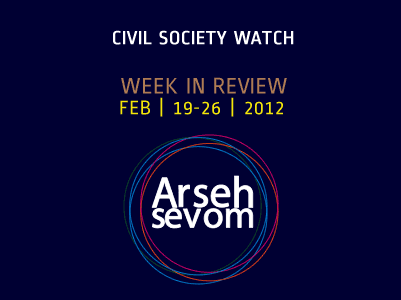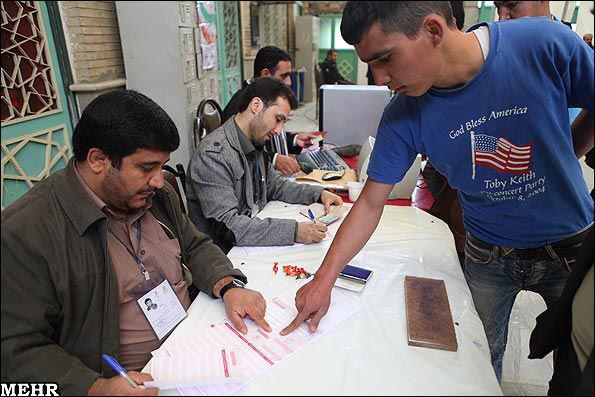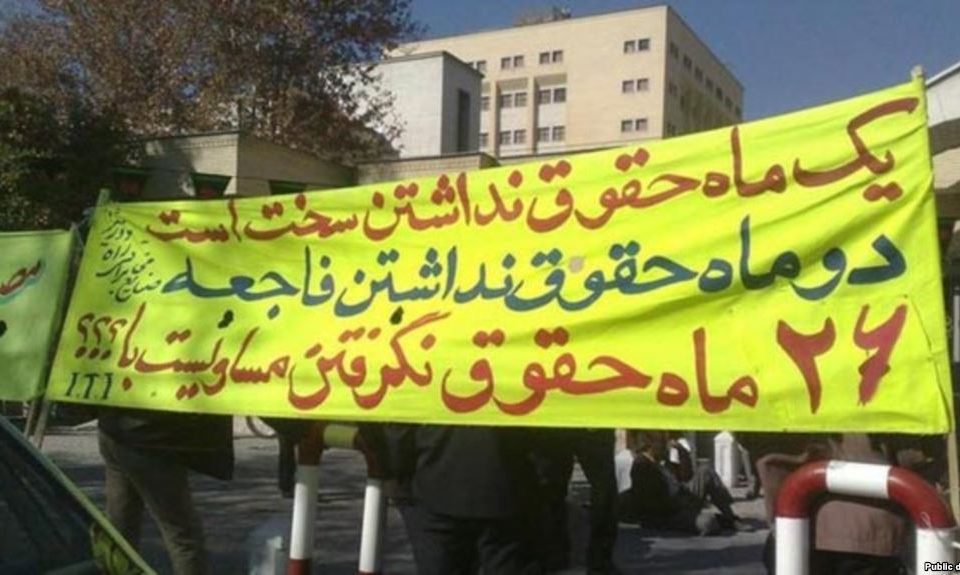
Staging Elections, Cracking Down on Civil Society — Week in Review
February 28, 2012Past issues of Arseh Sevom’s Newsletter
March 6, 2012This week was dominated by news of parliamentary elections, and threats of war, Asghar’s Oscar continued to bring some joy to people and to be a topic of discussion all over the world. In the streets of Tehran some even handed out candy to celebrate.
The New York Times has provided a flurry of opinion pieces on Iran and the effects of diplomacy, sanctions, and war: (Only Crippling Sanctions Will Stop Iran, Iran and Israel Share Bonds,Starving Iran Won’t Free It – NYTimes.com)A letter from United4Iran-London’s Kamran Hashemi published in The Financial Times stated:
As odd as it may appear, the western governments and Israel are doing everything possible in their power to ensure the survival of the Islamic Republic’s regime at the time when it is probably at its weakest state, desperately struggling to prove, with little success, its legitimacy both at home and abroad. With the gross mismanagement of the economy and widescale corruption, the Iranian economy is facing the bleakest prospects since the formation of the Islamic Republic. Faced with such calamities, the regime views the latest round of sanctions as a godsend.
Parliamentary elections were held in the Islamic Republic of Iran against a backdrop of calls for boycott by political opposition. The result of the elections is no surprise to any Iran-watcher: accusations of voter fraud, more than 100% turnout in some regions, and the success of the Supreme Leader’s candidates.
CONTENTS
Predictions Come True and Boycott Betrayed
Professional Groups Remain Mute
Press TV Shows Its True Colors in “Eye of the Fox”
The Butcher of the Press Gets a Promotion
Amnesty International Documents Systematic Abuses of Human Rights
Predictions Come True and Boycott Betrayed
There were no real surprises for many analysts and activists who expected the state-controlled media to affirm the Supreme Leader’s prediction of a massive turn-out. Opposition figures described the same event as “the most lifeless election in the history of the Islamic Republic.”
As Iran-watchers turned to the Internet to get a glimpse at the ballot boxes through the lens of netizens and to follow updates on social media (and yes, the internet was working pretty well on Election Day according to Arseh Sevom sources in Iran). former reformist president Mohammad Khatami – who was the first to open up the Islamic Republic of Iran to independent civil society – broke the opposition calls for boycott and cast his vote. This caused a lot of hand-wringing among the opposition including from Ayatollah Khomeini’s granddaughter and Khatami’s sister-in-law, activist Zahra Eshraghi, who posted on Facebook: “This was a heavy blow.”
On Sunday, March 4, Radio Zamaneh published a disturbing piece in which Khatami is quoted as saying to political activist Hossein Nourinejad:
“I had received some disturbing information in the last two days leading up to the elections, regarding plans and plots by the extremists in the establishment to be carried out after the elections, which had to be defused by some surprising action on my part.”
The former president expressed hope that his vote did not disrupt “reformist solidarity.” He has reportedly stressed the “complexity” of the internal as well as the international situation and called for “understanding of these complexities by everyone.”
Nourinejad reportedly asked the former president what he had written on his ballot, to which Khatami responded: “Islamic Republic.”
Iranian.com showed videos from polling stations in Iran and Tehran Bureau‘s Mohammad Sahimi explains that Iranians have their identity cards stamped when they vote, which has an effect on their lives in many ways from accessing government resources to finding work. He does a good job describing the complexity of the elections on the radio program On The Media. Tehran Bureau had a live blog on the day of the elections, which reported of roaming polling booths making visits to workplaces, extended voting hours, and the strict limitations on access by foreign journalists.
Professional Groups Remain Mute
Iranian human rights lawyer, Abdolfatah Soltani, was sentenced to 18 years in prison and 20 years barred from practice. Last week Iran’s bar association met to elect its board, while remaining silent on the cases of lawyers who are imprisoned unfairly. This is a direct result of state control of professional organizations and the persecution of lawyers who dare to represent clients who face abuses of their basic human rights.
Press TV Shows Its True Colors (Again) in “Eye of the Fox”
Last week’s review spoke of hints by the Revolutionary Guards via their site Gedareb.ir of revelations concerning BBC Persian. With the release of the transparent propaganda film by the Islamic Republic’s Press TV, “The Eye of the Fox,” the promise of new allegations is fulfilled.
Press TV shows “shocking” photos of Iranian journalists receiving training from the BBC in Turkey. They blame the BBC Persian for the unrest following the 2009 elections, accusing the organization of espionage. It broadcasts confessions, and shows the arrest of an Iranian female journalist in what appeared to be her home.
Around minute 19 of the film, Mohammad Kooshki, who is described as a media expert, defines “espionage” as: “depending on the national interests and laws of the country, what definition that country has of national interest, a certain action might be considered espionage in one country because the gathering of that information might threaten national security and render it illegal, but the same action might be considered reporting –not espionage– in another country.” He offers a purposefully vague definition of espionage that could easily be construed to meet the requirements of the day. Today speaking about the economy might be ok, tomorrow it could be threatening to national security.
Arseh Sevom has warned about the abuse security concerns to prosecute many of the Baha’i faith and human rights defenders.
Such an understanding of espionage is already crippling journalism in Iran as it gives arbitrary authority to the government to silence members of the press and, charging them with espionage and treason which is punishable by death according to Iranian law.
This film clearly serves two purposes:
1. To create a case for trying journalists and those who speak with journalists as spies, and
2. To warn anyone from speaking with foreign journalists about anything at all.
Arseh Sevom has already had contacts turn down interviews citing this film as the reason.
The Butcher of the Press Gets a Promotion
In our past Civil Society Review from the week of Feb.14, we wrote that Saeed Mortazavi’s vindication for the post- election (2009) torture and deaths at Kahrizak Detention Center had shocked many human rights activists still hoping for some positive development in Iran’s civil society. Just as this review was being finalized on March 4th, the Iranian newspaper, Tehran-e Emrooz reported on Mortazavi’s promotion to the head of the biggest financial holding organization in Iran, Social Security Organization [Sazman-e Tamin-e Ejtema’ie]. Fifteen parliamentarians protested the appointment citing his lack of experience with social security as a drawback.
In addition, Abd al-Hossein Rouh-al-Amini, leader of the Justice and Development Party and the father of Mohsen Rouholamini who was killed in Kahrizak, also sent a letter of protest concerning the appointment of Mortazavi.
As if to pour salt on the wounds of civil society activists and those who dare to speak out, this week Mehdi Mahmoodian, a prisoner of conscience who testified about the extensive use of torture in Kahrizak, was severely beaten “in the presence of the prison manager.” According to a letter written by his mother to the head of the prisons organization of Iran, much of the damage to him is not even treatable.
Amnesty International Documents Systematic Abuses of Human Rights
In a massive report released last week, Amnesty International documented systematic human rights abuses in the Islamic Republic of Iran. They speak of a quadrupling of public executions, the persecution of journalists, human rights defenders, and lawyers, and a crippled civil society. This well-documented report makes an elegant plea for continuing the work of the Special Rapporteur for Human Rights in Iran.
Amensty’s recommendations include:
- release immediately and unconditionally all prisoners of conscience – those detained solely for the peaceful exercise of their internationally recognized rights;
- amend legislation which unduly restricts the rights to freedom of expression, association and assembly, and to permit open public debate prior to the March 2012 parliamentary elections;
- establish an immediate moratorium on executions and work towards the complete abolition of the death penalty.
In the absence of independent and impartial bodies to investigate allegations of human rights violations and to provide reparations to victims and affected families in accordance with international human rights standards, the organization is also calling on the Iranian authorities to:
- allow international scrutiny of the human rights situation in Iran, including by allowing visits by the UN Special Rapporteur on Iran, in addition to other thematic UN human rights mechanisms which have requested visits, as well as independent international human rights organizations such as Amnesty International.
Amnesty International is also appealing to the international community not to allow tensions over Iran’s nuclear programme or events in the wider region to distract it from pressing Iran to live up to its human rights obligations as set out in a number of international human rights treaties to which it is a state party. In particular, Amnesty International is calling for:
- the UN Human Rights Council to renew in March 2012 the mandate of the Special Rapporteur on Iran;
- the international community to press the Iranian authorities to grant the Special Rapporteur on Iran access to the country and to fulfil commitments to receive visits by UN human rights mechanisms that have asked to visit Iran.
I’ll Be Watching You
The report from Amnesty comes in the wake of a report from The Committee to Protect Journalists, which lists Iran as the world’s worst jailer of journalists and netizens in 2011 with 42 imprisoned and 66 forced to flee the country. The report also names Iran as the world’s foremost internet oppressor.
Arseh Sevom continues to be concerned about the persecution of netizens and the further isolation of Iran’s population as a result of the planned “halal internet,” which may be launched this spring. There is much doubt that this is a completely homegrown effort. The results of a report done last year by the OpenNet Initiative which revealed that American and Canadian companies were supplying Iran with filtering software raise serious concerns.






